Hip pain when running? DO THIS!
Sep 01, 2022
Not many things are more annoying in our path to running glory than hip pain. For some, the pain comes on while we run. While for others, it's the aftermath that is most painful.
Is there something terribly wrong with your hip joint? Or maybe it's muscular. A tight hip flexor or muscle weakness?
Whatever the cause, you're concerned and looking for answers. Most importantly, you want to get back on the road. Or track. Or trail.
In this article, I'll tell you everything you need to know. I'll explain why you might be getting hip pain from running and what to do about it. I'll even give you my exact warm up that I use before I go on runs myself.
Let's start with the foundations though. What is it about running that causes hip pain?
Can Running Cause Hip Pain?
There may not be a more dynamic human movement than running. Running requires strength, endurance, balance, coordination and the list goes on and on
Experts in many fields now agree that humans used long-distance running to hunt animals. Many ancient tribes chased game animals for hours until the animals would fatigue and collapse. Source 1.
So it's fair to say the human body is designed to run. BUT, the modern human body is different than those of our ancestors. We don't move NEARLY as much as we used to.
For example, research indicates that the "average hunter-gatherer men and women walk about nine and six miles a day, respectively." Source 2.
And what do most modern human do instead of walking? Sit. Survival does not require nearly as much movement these days. Instead, to survive we must spend hours everyday sitting.
I'm sure this is nothing new to you. You are aware that sitting so much is not healthy. And you probably landed on this article because you're someone that tries to do something about it. You run!
And that's the irony of the pain right? Sitting causes negative health consequences. So you run...and experience negative health consequences? WTF.
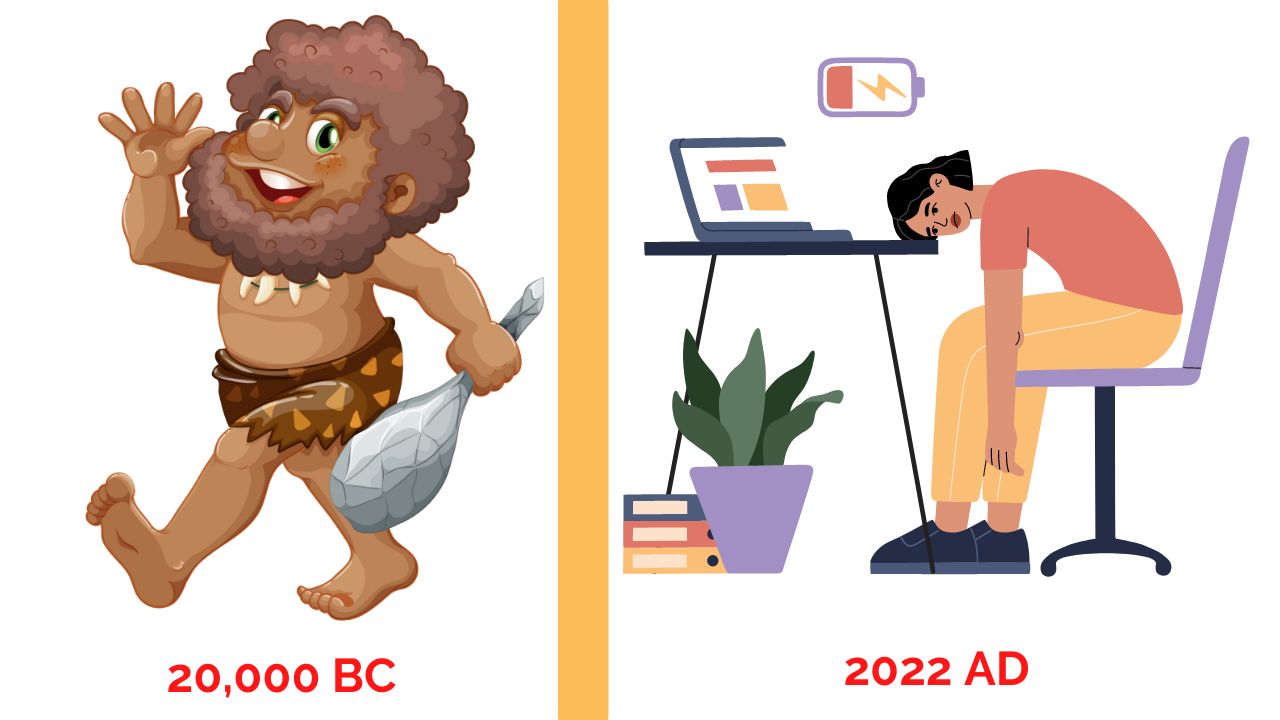
But should we blame running for our hip pain? We learned that our bodies are designed to run. So shouldn't running make us feel better? Shouldn't running be good for the hips and not make us feel worse?
As much as I love the idea of living like our paleo ancestors, this is not our reality. The fact is that our modern society is VERY different from that of humans living thousands of years ago.
Our ancestors moved a lot. When the human body moves, muscles activate. Tendons stretch. Ligaments and joints get much needed nutrients. The body is more capable. And this means it is ready to run after a deer for the next 11 hours.
Modern humans sit for most of the day. And when we sit, our muscles become atrophied. Our tendons stiffen. Our joints and ligaments don't get much needed nutrients from a body that is constantly moving.
But then we get frustrated when we experience pain or discomfort when we run. We ask our body to go from 0 to 100 with a snap of a finger.
It is not running that causes hip pain. It is the body we are bringing to the run that causes hip pain. It is the imbalance and dysfunction caused by so much sitting and inactivity that causes our hips to hurt when we run.

But fear not! There is good news. There is a solution. And no, it is not to just walk and move more. Although that certainly will help.
Let's first examine the two most common ways hip pain shows up when running. The recommendations will vary slightly depending on which camp you fall in.
Hip Pain While Running
The first group of unlucky runners will experience hip pain while running. This sucks extra hard because the pain might make it difficult to enjoy the run.
To reduce hip pain while running, I recommend implementing two strategies. One is physical and one is mental.
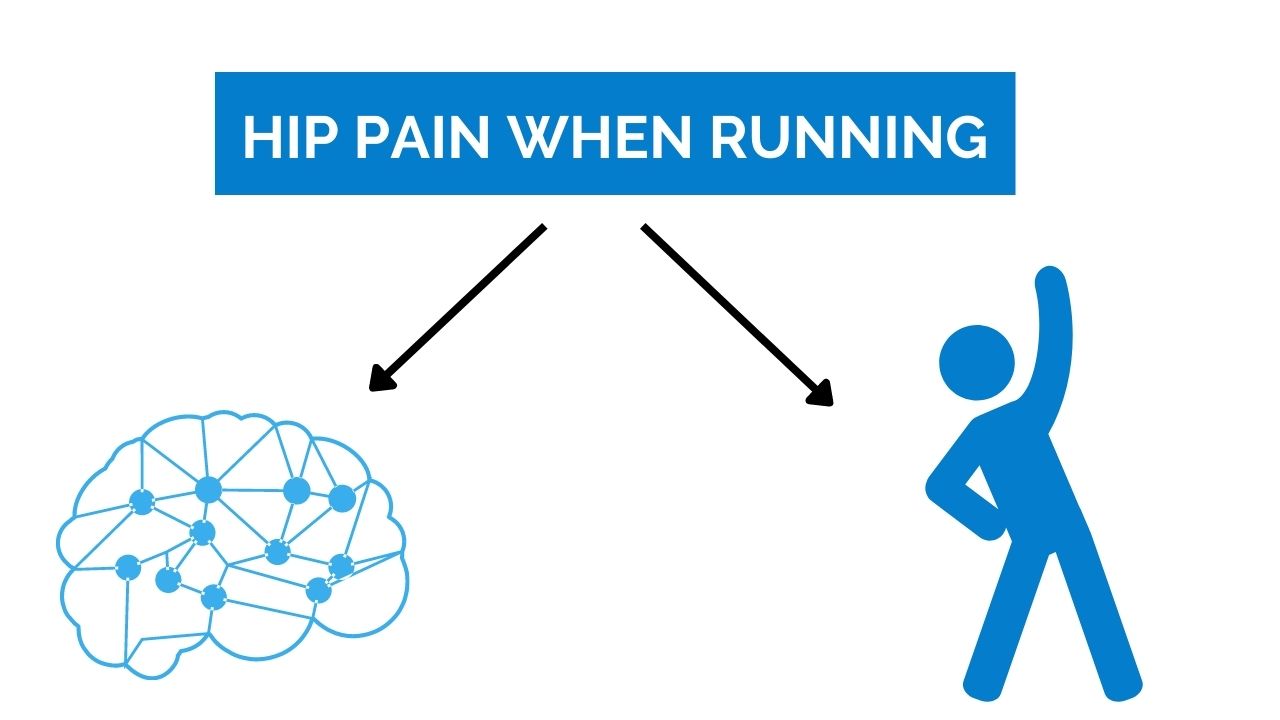
For the physical side of things, we want to implement a warm up that activates the ENTIRE body. And not just the hips. I see too many people make the mistake of stretching or warming up only the joint that bothers them before running.
This is a big NO-NO. Nothing in the body works in isolation. In fact, it might be even more important to warm up the other joints when we experience hip pain from running. Why?
Because pain in one joint may be a sign that other joints in the body are not equally contributing. Pain in the hip might be a sign that the hip is working extra hard. The shoulders, ankles, knees, spine and other load joints are not picking up the slack.
The below video demonstrates the warm-up I use before each of my runs. It's about 10 minutes because we don't want to spend more time warming up then running. It also activates the muscles around the major load joints - ankles, shoulders and hips.
As for the psychological aspect, we need to understand an important concept. Pain comes from the brain. The brain sends our awareness pain signals when it feels we are threatened and need to take action. Source 3.
And these pain signals show up even when there is no tissue damage. So there can be nothing terribly wrong in your hip despite getting pain signals while you run. Why does this matter?
Because you can use this scientific fact to your advantage. You can tell your brain "Thanks for the pain signal, brain. I'm going to keep running anyway. I'll work on my muscle function later."
For some people, this alone will work! It might sound odd to you but this is based on real scientific data. Our nervous system can be overly-sensitive sometimes. Especially during a dynamic and challenging activity like running.
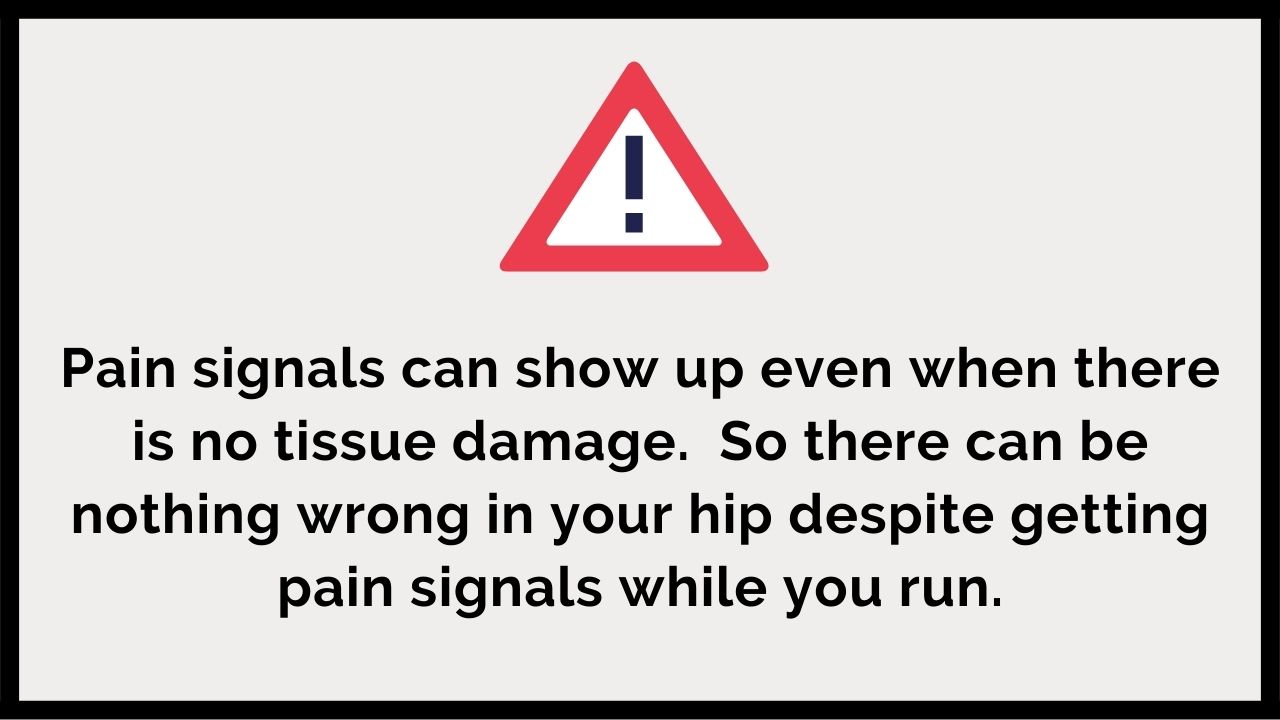
Also, there is absolutely no harm is experimenting with this strategy. Worst case scenario, it does not work. And you continue working on how your hips function through corrective exercise.
When I work with people, I always recommend attacking the pain from two angles - physical and psychological. Both are incredibly important.
If you're looking for more exercises to address your hip function, try my free hip starter course. It's a great way to jump start your recovery out of chronic hip pain.
What if we feel fine during our run but only feel hip pain after running? Do the recommendations above change?
Pain in Hip After Running
You feel like an ancient hunter gatherer tracking your next meal while you run. You're breaking PRs. You get the runner's high. The body feels great during the run.
A few hours after your run, it happens. The pain in the hip shows up AGAIN. How is this possible? You felt so great during the run. Why would the pain show up so much after the fact?
There is no simple answer to this. Most likely, you're nervous system is deciding that there is no imminent threat while you run. There are other things to worry about, like running safely and efficiently.
But when the body is able to rest and starts to recover, the nervous system begins recognizing the threat. And pain signals are sent to your awareness.
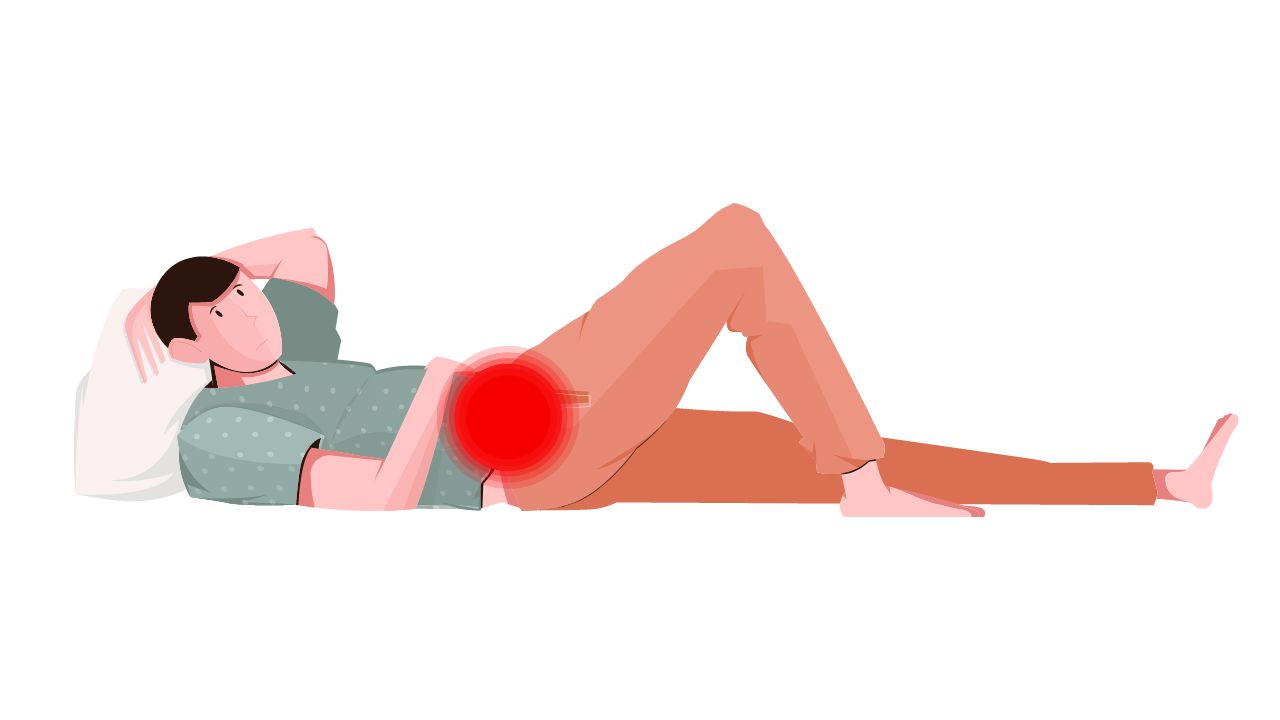 Are the strategies for experiencing pain after you run different than during? Yes and no. The reasons for pain don't change. Either there is imbalance and dysfunction in the body or the nervous system is overreacting to a benign threat. OR BOTH.
Are the strategies for experiencing pain after you run different than during? Yes and no. The reasons for pain don't change. Either there is imbalance and dysfunction in the body or the nervous system is overreacting to a benign threat. OR BOTH.
I highly recommend you do the warm up I shared in the above section. Just scroll up if you skipped to this section and you will find it. It prepares the ENTIRE body for the run - not just the hips - which many people put too much focus on in their warm ups.
In addition, I recommend performing a cool-down after your run. This will help relieve hip pain from running in two ways. First, it will bring the body back into balance after any dysfunction in your run. Second, it will relax and bring ease to the nervous system.
Here is a recommended cool-down for you to try after your runs:
I pulled these exercise directly from my Happy Hips Course. This is my premium flagship course where I teach students how to permanently eliminate chronic hip pain. Learn more here.
In the above section, I mentioned that there are two main reasons why we experience hip pain. The first is physical. The second is psychological. We dealt with the physical aspect. So what psychological strategies can we integrate when feeling hip pain after our runs?
Another important concept in pain science is that expectations drive experience. When we perceive or anticipate pain from a certain activity or movement, guess what happens? We get pain. Expecting pain is a risk factor for developing chronic pain. Source 4.
If we expect hip pain to show up after we run, it is more likely it will continue to happen. Our brain has created a pattern. Run - Pain. And our desperation to "fix" the problem fuels the pattern even more.
"Ok Maks, but what do I do about this. I get hip pain after running. I can't just think it away." It's true, you can't think away pain. But what you can do is respond with more indifference. Typically, there is some fear, frustration or other strong emotion associated with the pain pattern.
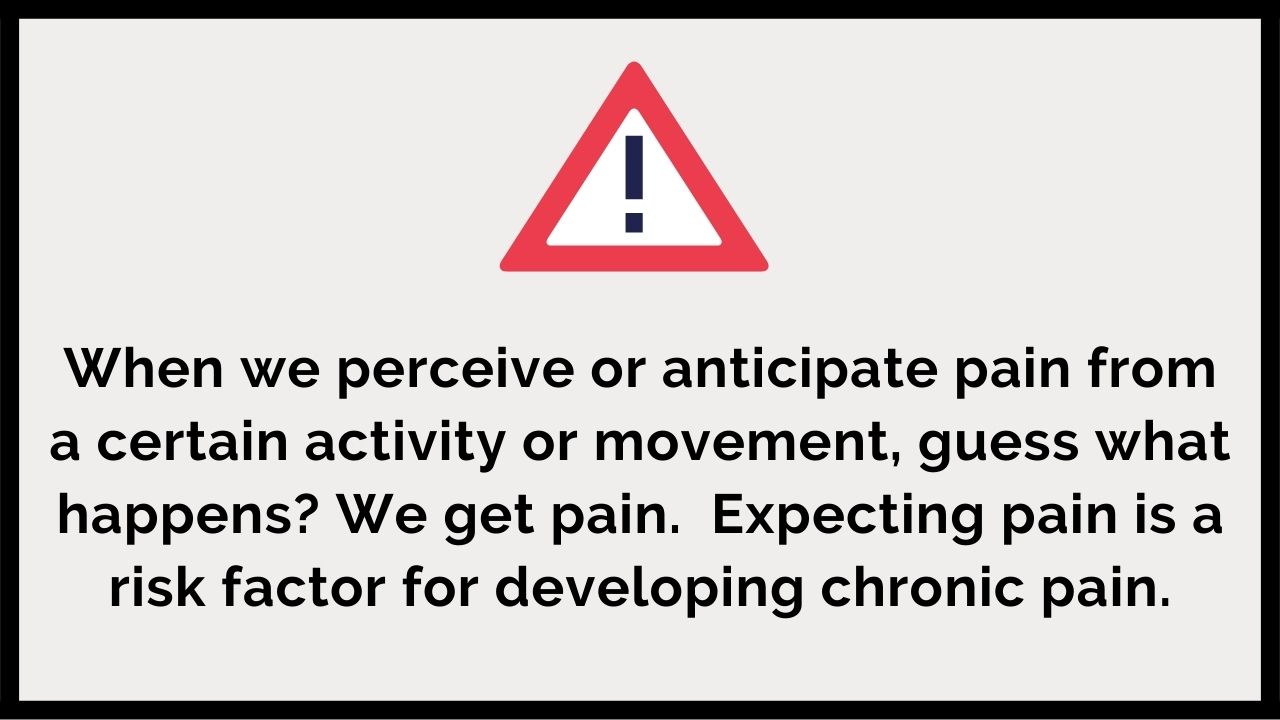
If your brain tells you "Shit, I'm definitely going to get hip pain after this run." Instead of responding with fear, worry or anger, try responding with a simple "Maybe." That's it. Maybe you will get hip pain later. You will deal with it then.
This is the first step of untangling a possible pain pattern that has existed within your nervous system for quite some time. For many people, understanding how pain works and how to respond to pain signals is the biggest difference maker in their journey out of chronic hip pain.
I teach students how to systematically practice and learn psychological skills in my Happy Hips course. And of course, I also teach people how to build stronger and more resilient hips!
Closing Thoughts on Hip Pain from Running
Getting rid of hip pain from running is not done by simply stretching and foam rolling the hip. There is more nuance. From both a physical and psychological level.
Warming up and cooling down the entire body is critical. Focusing too much on just the hips will provide limited, if any, pain relief.
In addition, we must respect the psychological factors for chronic hip pain. Neglecting or thinking these factors don't apply to you is a recipe for perpetual pain in the body. Whether in the hips or elsewhere.
I like to say my website is your last stop for pain free hips. But in reality, it's your last stop for a pain-free body. I teach people how to improve the function of their entire body and how to think about their pain.
These are the skills needed to cope with the inevitable pain that shows up in our lives. Experiencing pain as a human being is inevitable. The question is: are you prepared for it?



